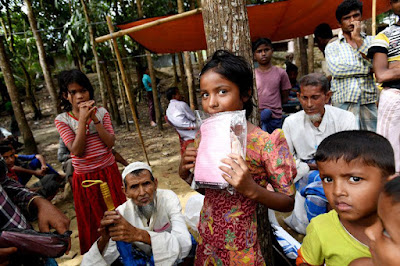Bangladesh and Myanmar on Tuesday reaffirmed their commitment to begin repatriating Rohingya refugees from January, despite growing concern that their safety is still not assured should they return.
The foreign secretaries of Bangladesh and Myanmar met in Dhaka to finalise the agreement signed on November 23 for the voluntary return of nearly three-quarters of a million stateless Rohingya living in refugee camps along the border.
A new working group would "ensure commencement of repatriation within two months" by developing a timetable for the verification of refugee identities and logistics of their return, Bangladesh's foreign ministry said in a statement.
"Now, we will start the next step of our work," Bangladesh foreign minister A.H. Mahmood Ali told reporters after the meeting.
But there is growing doubt that the persecuted minority will be safe if returned to Rakhine state, where Doctors Without Borders said nearly 7,000 Rohingya were killed in a month of violence.
An estimated 655,000 refugees from the stateless group have poured across the border into Bangladesh since August, fleeing what the US and United Nations have described as ethnic cleansing.
UN rights chief Zeid Ra'ad Al Hussein said he had received no assurances that international observers would be allowed into northern Rakhine to monitor the return of the Rohingya.
"We have seen no interest or desire to invite my office in. So we are sceptical of that," he told AFP in an interview Monday.
Human Rights Watch on Monday, citing analysis of satellite imagery, said Myanmar's army burned down dozens of Rohingya homes within days of the signing of the repatriation deal.
The watchdog said the repatriation deal was "a public relations stunt" and warned the Rohingya would not be safe in Rakhine without guarantees of equal rights and protections.
The Rohingya have been the target of past pogroms in Buddhist-majority Myanmar, which does not recognise the group as a genuine ethnicity and has stripped them of citizenship.
- 'We want justice' -
Testimonies gathered by AFP from displaced Rohingya in Bangladesh suggest few refugees wish to return to Myanmar, where many saw their villages burned to ashes and loved ones killed.
"We will not go back to our country until our rights are afforded," said Rohingya refugee Roushan Ali from a camp in Bangladesh's southeast.
"We want full citizenship and the return of our land and property. We also want justice for our people who were slaughtered, tortured and raped."
British charity Oxfam said in a new report Tuesday that many Rohingya were terrified of returning and unwilling to consider it without guarantees of safety.
Conditions remain bleak in Bangladesh's displacement camps, with an outbreak of diphtheria having killed 19 refugees so far, the International Organization for Migration said Tuesday.
Myanmar's leader Aung San Suu Kyi has said major security operations against Rohingya terrorists stopped in early September.
Responding to international pressure, Suu Kyi's civilian government signed an agreement with Bangladesh to start the repatriation of the stateless Muslim refugees within two months.
The agreement promises the "safe and voluntary return" of displaced Rohingya in Bangladesh -- not just the latest 655,000 new arrivals but more than 70,000 from a separate influx in October 2016.
In a joint statement Tuesday after a meeting in Colombo, the leaders of Sri Lanka and Malaysia -- the latter home to a sizeable Rohingya diaspora -- called for the repatriation process to be "undertaken expeditiously".
Aid groups have warned Myanmar they would boycott any new camps for Rohingya returnees, saying refugees must be allowed to settle in their own homes and not forced into ghetto-like conditions.
© AFP


Comments